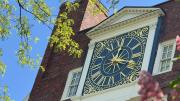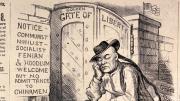Last year, the publication of his Collected Poems returned Robert Lowell '39 to the center stage of American poetry. From 1946, when he won the Pulitzer Prize for his first book, Lord Weary's Castle, until his death, Lowell (1917-77) was widely considered the leading poet of his generation. His writing had an ambition and grandeur rare in any period, and especially so in the second half of the twentieth century, when poetry became an increasingly marginal art. As the critic Edmund Wilson wrote, Lowell and W.H. Auden were the only poets of their time who had "big enough talents to achieve poetic careers on the old nineteenth-century scale."
Even more remarkable, Lowell's art was constantly evolving. The complex, ambiguous verse of Lord Weary's Castle gave way to the harrowingly personal poems of Life Studies, whose publication in 1959 started a new era in American poetry. But while hundreds of poets were imitating Lowell's "confessional" verse, he had already moved on; the poems he wrote in the 1960s address the largest public themes, history and culture and politics, as well as the dilemmas of private life.
But reading the Collected Poems also makes clear a less obvious part of Lowell's achievement: he was the great poet of Harvard. Of course, a roster of the poets associated with Harvard, as teachers or students, would include a large share of twentieth-century American poetry, from Wallace Stevens, A.B. 1900, Robert Frost '01, and T.S. Eliot '10 down to Elizabeth Bishop, who taught often at the University, Maxine Kumin '46, John Ashbery '49, Frank O'Hara '50, and Adrienne Rich '51. But no other poet wrote about Harvard so much or so well as Lowell. For no other poet of comparable stature was Harvard, or possibly any college, so important. Harvard appears by name in at least 20 of Lowell's poems, and provides the background to many more. In a 1971 interview, Lowell said that he "wrote about only four places": "Harvard and Boston, New York and Maine." These were not just "places I lived in," Lowell said, but "symbols, conscious and unavoidable."
Lowell's connections to Harvard were multiple. His mother had signed him up for his prep school, St. Mark's, before he was even born, and the expectation that he would go to Harvard was at least as strong. As a descendent of Boston's Brahmin elite, he belonged to the social class that the College had long served. What's more, he was a cousin of A. Lawrence Lowell, president of Harvard from 1909 to 1933. When Lowell entered Harvard as a freshman in 1935, he lived in Lowell House (room A-41), and would spend evenings with his illustrious relative—"the grand fin-de-siècle president," as the poet later recalled him, "very deaf, very sprightly, in his eighties."
A. Lawrence Lowell was also a reminder of the family's close connection to literature: his sister, Amy, was one of the most visible American Modernist poets. In the 1910s, she helped to bring Ezra Pound's "Imagism"—a spare, precise, heavily nuanced style, influenced by Japanese and Chinese verse—to American poetry. A still earlier relative, James Russell Lowell, had been a Harvard professor and popular poet of the nineteenth century, as well as American ambassador to England.
It might seem that this family legacy would have been an advantage for the freshman poet. In fact, being a Lowell was no help in Harvard's literary set. The Harvard Advocate Centennial Anthology records what happened when Lowell tried out for the Advocate, Harvard's undergraduate literary magazine, which prided itself, then as now, on its exclusivity. "When Robert Lowell was ... a candidate for the Advocate's literary board, he was asked to tack down a carpet in the sanctum [the magazine's South Street office], and when he was finished, told that he needn't come around any more." A quarter-century later, Lowell was forgiving enough to admit, "I wasn't a very good writer then, perhaps I should have been turned down."
If Lowell's name carried no cachet at Harvard, the young writer himself saw it as a positive burden. For one thing, the two poets in the family, for all their historical significance, were distinctly minor talents, and they seemed, by the 1930s, merely quaint. "When I began writing," Lowell said in a 1961 Paris Review article, "it would have been unimaginable to take either Amy or James Russell Lowell as models." It was even rather embarrassing to be associated with such Establishment figures. When Lowell was introduced to Ford Madox Ford, he had to overcome the novelist's skepticism: "Wasn't I, as Ford assumed, the grandson or something of James Russell Lowell and the cousin of Lawrence Lowell, a young man doomed to trifle with poetry and end up as president of Harvard or ambassador to England?"
No wonder Lowell wanted to dissociate himself from his ancestors. His attitude toward them is captured in a wonderfully improbable Harvard anecdote, which Lowell told in both prose and verse. When he was 25, no longer a student but not yet known as a writer, he met T.S. Eliot, whose connection to Harvard was oddly parallel to his own. Eliot had been an undergraduate at Harvard a quarter-century before Lowell, just as his own relative, Charles W. Eliot, was finishing his long tenure (1869-1909) as president. And Eliot's own literary ancestry dated back to the reign of Henry VIII, when Sir Thomas Elyot wrote the Boke named the Governour. The young poet was delighted, then, to hear Eliot's mischievous take on his family:
Behind us, Harvard's Memorial Hall with its wasteful, irreplaceable Victorian architecture and scrolls of the Civil War dead. Before us, the rush-hour traffic. As we got stuck on the sidewalk, looking for an opening, Eliot out of a blue sky said, "Don't you loathe being compared with your relatives?" Pause, as I put the question to myself, groping for what I really felt, for what I should decently feel and what I should indecently feel. Eliot: "I do." Pause again, then the changed lifting voice of delight. "I was reading Poe's reviews the other day. He took up two of my family and wiped the floor with them." Pause. "I was delighted."
Ironically, however, Lowell's own family was even less impressed than the outside world by their poetic relatives. In "91 Revere Street," the prose memoir included in Life Studies, he gives a satirical portrait of his mother's feelings on the subject:
Amy Lowell was never a welcome subject in our household....was poetry what one could call Amy's loud, bossy, unladylike chinoiserie—her free verse!...Whenever Amy Lowell was mentioned, Mother bridled. Not distinguishing, not caring whether her relative was praised or criticized, she would say, "Amy had the courage of her convictions. She worked like a horse." Mother would conclude characteristically, "Amy did insist on doing everything the hard way. I think, perhaps, that her brother, the president of Harvard, did more for other people."
But as "91 Revere Street" shows, the main targets of Lowell's passionate rebellion were not those dusty literary ancestors: they were his parents, and the whole milieu they represented. For Robert Lowell to achieve his independence, both personally and poetically, meant overcoming all the burdens and expectations associated with his name. It was only after he had successfully rebelled against his family that he was able to become one of its greatest representatives.
And Harvard was the first target and casualty of his revolt. According to Lowell's biographer Ian Hamilton, "By the time he entered Harvard," Lowell "had hardened into a state of near rebellion," especially against his seductive and domineering mother, Charlotte. "Charlotte believed in Harvard; it was to be expected that Lowell would therefore decide to treat Harvard with contempt." Before long he stopped going to classes, and he returned for his sophomore year only reluctantly. A letter written in the summer of 1936, to the poet Richard Eberhart, his former prep-school teacher, complains that "College, and especially the life it forces on one," bred "a neurotic condition, confusion piling up inside and nothing able to gain an outlet."
The crisis that had been building for months finally exploded in late 1936, and by the time it was over, Lowell had left Harvard for good. He resumed his studies the next fall, at Kenyon College in Ohio, and graduated with a Kenyon diploma. In the Paris Review interview, a quarter of a century later, Lowell glossed over the reasons for his abrupt departure: "I'd made the acquaintance of Merrill Moore," the poet and psychologist, who "said that I ought to study with a man who was a poet"; Moore was friends with the Southern poet John Crowe Ransom, and it was to study with Ransom that Lowell went to Kenyon. His parents, Lowell claimed, accepted the decision: "They'd rather have had me a genial Harvard student, but at least I'd be working hard this way. It seemed to them a queer but orderly step."
In fact, the reason Lowell left Harvard was a tremendous clash with his parents, which ended in his literally coming to blows with his father. In "Rebellion," a poem from Lord Weary's Castle, Lowell wrote about this fight in the impersonal style of his early verse:
There was rebellion, father, when the mock
French windows slammed and you hove backward, rammed
Into your heirlooms, screens, a glass-cased clock,
The highboy quaking to its toes. You damned
My arm that cast your house upon your head
And broke the chimney flintlock on your skull.
The formal diction and symbolism of Lowell's early work, in keeping with the principles of influential New Critics like Ransom, conceal nearly all the biographical details. By the time Lowell goes on to invoke "Behemoth and Leviathan," it is doubtful whether it is something that actually happened to the poet at all. Perhaps the best way to gauge how Lowell's poetry changed is to look at how he treated the same event in "Anne Dick 1. 1936," a poem published in History in 1973:
Father's letter to your father said
stiffly and much too tersely he'd been told
you visited my college rooms alone—
I can still crackle that slight note in my hand.
I see your pink father—you, the outraged daughter.
That morning nursing my dark, quiet fire
on the empty steps of the Harvard Fieldhouse in
vacation...saying the start of Lycidas to myself
fevering my mind and cooling my hot nerves—
we were nomad quicksilver and drove to Boston;
I knocked my father down. He sat on the carpet—
my mother calling from the top of the carpeted stairs,
their glass door locking behind me, no cover; you
idling in the station wagon, no retreat.
Lowell no longer dignifies the facts into symbol; instead, he gives names and details, as in a letter or diary. The origin of the quarrel was Lowell's whirlwind engagement to Anne Dick, an older woman, of whom his parents disapproved. The "slight note" that Lowell's father sent to Anne's, impugning her virtue, is quoted in Hamilton's biography: "I wish to ask that you and Mrs. Dick do not allow Ann [sic] to go to Bobby's rooms at college without proper chaperonage. We know that she has been there once and rather think that she is in the habit of doing so. Such behavior is contrary to all college rules, and most improper for a girl of good repute."
It was this insult that provided the occasion, or perhaps the excuse, for Lowell's act of violence. And Merrill Moore's recommendation that Lowell leave Harvard for Kenyon was not simply the advice of a literary mentor, but the prescription of a doctor called in by Lowell's parents to determine if his attack on his father was the act of a dangerous lunatic. The departure from Harvard was not just a pedagogic decision, but a lifesaving escape.
But the end of Lowell's undergraduate career was just the beginning of his relationship with Harvard. Throughout his life, his poetry remained preoccupied with questions of family, inheritance, and history; and in all these connections, Harvard was an inevitable subject. It carries an especially heavy symbolic freight in "Waking in the Blue," one of the best poems in Lowell's groundbreaking Life Studies. A vignette of one of the poet's periodic stays at McLean, the Boston-area mental hospital, "Waking in the Blue" uses his fellow blueblood patients to suggest the decline of a class and a tradition.
In the poem's quiet orchestration of symbols, Lowell opposes the robust "Roman Catholic attendants," one of them "a B.U. sophomore," to the "thoroughbred mental cases" who are, one and all, products of Harvard. There is "Stanley, now sunk in his sixties,/once a Harvard all-American fullback," who lies in the tub wearing "a crimson golf-cap"; there is "'Bobbie,'/Porcellian '29,/a replica of Louis XVI/without the wig." And, of course, there is the poet, who tacitly identifies himself with these New England decadents:
see the shaky future grow familiar
in the pinched, indigenous faces
of these thoroughbred mental cases,
twice my age and half my weight.
We are all old-timers,
each of us holds a locked razor.
These are "old-timers" in a double sense—they come from old New England families, and they are veterans of the locked ward. In "Waking in the Blue," Harvard joins the Statehouse dome, the Public Gardens, and other Boston locales as Lowell's poetic symbols of Puritan decline.
Once Lowell returned to Harvard as a teacher, however, the school became less of a symbol in his poetry, more an actual place. From 1963 to 1977, with some interruptions, Lowell spent one semester a year at Harvard, teaching creative writing and literature. Most years, he would commute to Cambridge from Manhattan, claiming "[I]t's really almost easier for me to fly to classes from New York than to drive in from Brookline." He spent a couple of nights a week in a suite of rooms in Quincy House ("very modern, all glass, with walls of unfinished cement brick," he wrote to Elizabeth Bishop), and his class met in the Quincy House basement, below the dining hall.
The classes included many future poets and writers, whose reminiscences have turned Lowell the teacher into a minor Harvard legend. Last year, in an essay in the Boston Phoenix, Lloyd Schwartz, Ph.D. '76, remembered how Lowell "would let his cigarette ash get longer and longer....Sometimes we got hypnotized by the ash—wondering when and where it was going to fall." And James Atlas '71 has given a hilarious portrait of Lowell's monologues comparing his bewildered students to Swinburne or Hardy ("You could see these stanzas in The Dynasts. Only with Hardy it would require eight hundred lines instead of eight").
Teaching at Harvard also had an unmistakable effect on Lowell's poetry. By the mid 1960s, he had begun writing almost exclusively in a form of his own invention—an unrhymed sonnet, filled to bursting with dense and musical pentameter lines. In Notebook (1969), he used the form to chronicle the public and personal events of 1967-68; later, in 1973, he split the Notebook poems into two expanded volumes, History and For Lizzie and Harriet, and simultaneously published a new book of sonnets, The Dolphin. Inevitably, Harvard plays a significant role in these poems, as it did in Lowell's life when they were written. And for the first time, it is a Harvard more like the one a student or teacher knows today: not a Brahmin finishing school, but a tumultuous borough of the young. Harvard is where Lowell observed the upheavals of the late 1960s, and where his relationships with students made him increasingly aware of aging and mortality.
In some poems, Harvard appears merely as background or incidental detail: in "Dawn," the poet looks out his window and notices that "on a wafer balcony, too thin to sit on,/a crimson blazer hangs, a replica/of my own from Harvard—hollow, blowing,/shining its Harvard shield to the fall air...." Other sonnets are jotted journals of life in Cambridge, like "Blizzard in Cambridge": "Risen from the blindness of teaching to bright snow,/everything mechanical stopped dead, /taxis no-fares...." A pair of poems turns into verse the anecdotes about Ford Madox Ford and T.S. Eliot that Lowell had already told in prose. And "Eating Out Alone" captures the predicament of a famous writer on his own at lunchtime in Harvard Square:
The loneliness inside me is a place,
Harvard where no one might always be someone.
When we're alone people we run from change
to the mysterious and beautiful—
I am eating alone at a small white table,
visible, ignored...the moment that tries the soul....
Harvard comes into its own as a poetic subject when Lowell treats it as the scene of erotic and political entanglement. In both areas, Lowell charts the difference between himself, a product of traditional, Protestant, masculine Harvard, and the students of the Age of Aquarius. Like many writers of his generation, he envies the sexual freedom of the young, while suspecting that something has been lost along with the strict code his father once invoked against Anne Dick:
the young are mobile, friends of the tossed waste leaf,
bellbottom, barefoot, Christendom's wild hair—
words are what get in the way of what they say.
None sleeps with the same girl twice, or marches homeward
keeping the beat of her arterial vein....
The freedom of the young verges on recklessness, especially in the political realm. The chaos of the late 1960s makes Lowell prize Harvard all the more, as a preserve of liberal values: "Say the worst, Harvard at least speaks English,/words are given a fighting chance to speak." But the threat of anarchy and revolution is always in the air, as in "The Revolution," which adapts a letter sent to Lowell by his former student, the poet Richard Tillinghast:
"We're in a prerevolutionary situation
at Berkeley, an incredible, refreshing relief
from your rather hot-house, good prep-school Harvard riots.
The main thing is our exposure to politics;
whether this a priori will determine
the revolutionary's murder in the streets,
or the death of the haves by the have-nots, I don't know;
but anyway you should be in on it—
only in imagination can we lose the battle."
If politics loom in the middle distance of Lowell's Harvard poems, the foreground is occupied by sex. For the middle-aged poet, there is an obvious, hectic allure to being surrounded by students: "Nothing less nutritive than the thirst at Harvard," he writes, "it's as bad for me at fifty as nineteen—/the thirst for grown-ups, open cars and girls...." Caroline Blackwood, his third wife, agreed that "he was so edgy at Harvard and he was so on the brink all the time—encouraged by all those hangers-on who tried to make him sit up all night drinking."
The natural result was the love affairs with young women, possibly but not explicitly students, which Lowell chronicled in Notebook and For Lizzie and Harriet. "Chaucer's old January made hay with May," he notes in the short sequence "Harvard," and he is constantly aware of both the joy and the humiliation of such romances:
all flesh is grass, and like the flower of the grass—
no! lips, breasts, eyes, hands, lips, hair—
the overworked central heating bangs the frame,
as the milkhorse in childhood would clang the morning milkcan.
Another sonnet in the sequence anchors this pathos to a random, indelible image, using a favorite technique of Lowell's later verse. The setting seems to be his rooms at Quincy House, near the "green copper dome" of the Harvard river Houses:
Lying in bed, I see a blind white morning
rise to mid-heaven in a gaggle of snow—
a silk stocking is coiling on a wire hanger
rapier-bright...they dangle from my tree,
a long throw for a hard cold day...wind lifting
the stocking like the lecherous, lost leg....
The students, my swarm-mates, rise in their hundreds, and leave
the hive—they can keep time. I've slept so late
I see my stubble whiten while I shave;
the stocking blows to smog, the steel coathanger stains.
The abandoned stocking becomes an emblem of lechery, seductive and forlorn. And the brilliant last lines elide the decades separating the student from the professor—as though, like Rip Van Winkle, he has merely slept the time away, or his beard turned white while he stood at the mirror shaving. It is one of Lowell's most moving poems, and captures something of the strange pathos of every college, constantly casting off the old to make room for another batch of the young.
In these poems of the late 1960s, Lowell still feels himself to be on both sides of this divide, old and young at once—one of what he calls, sardonically, "the late middles." But in his very last book, Day by Day, published in the year of his death, the transition is complete; and two Harvard poems mark Lowell's new perspective. In "Return in March," he sees that "The Georgian thirties' Harvard houses," new when he was a student, "have shed their brashness in forty years," and allies himself with them: "architecture suffers decline with dignity." And in "To Mother," he no longer even tries to see himself as one of "the students, my swarm-mates," finding a different animal metaphor more fitting:
The humpback brick sidewalks of Harvard
kick me briskly,
as if allowed the license of age;
persons who could hardly walk or swallow,
when I was a student,
angrily grate like old squirrels
with bandages of white hair about their ears.
From the "hot nerves" of the undergraduate to the "white hair" of the professor: Lowell has traveled from one end of Harvard's timeline to the other. And at every stage, he used it as setting and symbol for his poetry, binding himself to Harvard more intimately than he could ever have imagined when he quit the school at age 20. Nearly 30 years after his death, when we walk through the campus, the Harvard of Robert Lowell's poetry is still part of the Harvard we see.
Adam Kirsch '97 is the book critic of the New York Sun. His last feature for this magazine was "The Five-Foot Shelf Reconsidered," published in the November-December 2001 issue.





